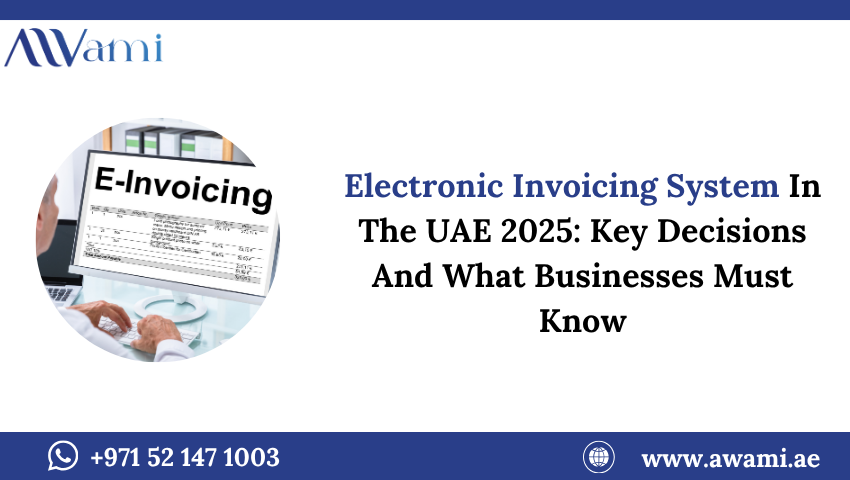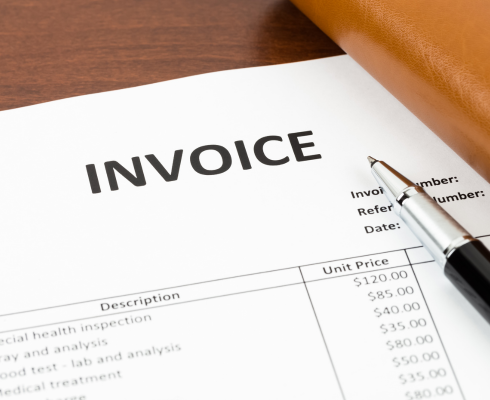
The UAE Ministry of Finance has announced the issuance of two Ministerial Decisions detailing the scope, obligations, and phased timelines for implementing the Electronic Invoicing System (E-Invoicing) across the country. This move marks a milestone in the UAE’s journey towards comprehensive VAT compliance and digital tax transformation, impacting all businesses and government entities engaging in taxable transactions.
Table of Contents
ToggleIntroduction: The Future of Invoicing in the UAE
The UAE is rapidly embracing digital transformation, with the Ministry of Finance officially launching the Electronic Invoicing System, commonly known as E-Invoicing, for businesses and government entities. This initiative aims to enhance VAT compliance, streamline business operations, and align the nation with global best practices for digital economies.


What is E-Invoicing? Understanding the e-invoice meaning
E-Invoicing, or “electronic invoicing,” refers to the creation, transmission, and reception of invoices and credit notes in a digital, structured, machine-readable format such as XML or JSON. This system excludes traditional PDF or paper invoices, which are not valid under the new Electronic Invoicing System.
The core features include:
Automated invoice processing and validation.
Standardization across business sectors.
Secure, real-time reporting to the Federal Tax Authority (FTA).
In essence, e invoice meaning in the UAE context focuses on digital efficiency, accuracy, traceability, and regulatory compliance.
Background: Why the UAE Introduced E-Invoicing
The launch of the Electronic Invoicing System is part of the UAE’s broader strategy to fuel digital economic growth and set new benchmarks in tax administration. Key objectives include:
Clamping down on tax fraud and evasion.
Boosting transparency and trust in business transactions.
Reducing administrative costs related to manual invoice processing.
This shift supports both B2B (business-to-business) and B2G (business-to-government) transactions, with phased plans to cover B2C (business-to-consumer) operations in the future.
Scope of Obligations: Who Must Comply?
Ministerial Decision No. 243 of 2025 makes E-Invoicing mandatory for all VAT-registered businesses in the UAE engaged in B2B and B2G transactions. The key points are:
- All businesses issuing or receiving invoices must use an Accredited Service Provider (ASP).
- Issuers and recipients must process invoices and credit notes electronically and ensure all documents carry prescribed data fields.
- The E-Invoicing System is built on the international OpenPeppol standard for interoperability and security.
Exclusions
Not all transactions are immediately covered; certain B2C dealings and specific activities may initially be excluded, though voluntary adoption is allowed in these cases.
Implementation Timelines: When Will E-Invoicing Be Mandatory?
The UAE will implement its Electronic Invoicing System in a phased approach to ensure a smooth transition for all businesses across the country. The pilot programme will commence on July 1, 2026, involving selected taxpayers who will test and provide feedback on the system’s operation before mandatory rollout stages.
Large businesses, defined as those with annual revenues of AED 50 million or more, are required to appoint an Accredited Service Provider (ASP) by July 31, 2026, and must fully implement the e-invoicing system by January 1, 2027.
Smaller businesses, with revenues below AED 50 million, have a later deadline for ASP appointment by March 31, 2027, and must adopt the system by July 1, 2027.
Additionally, all relevant government entities fall under this mandate, needing to appoint an ASP by March 31, 2027, and fully implement electronic invoicing starting October 1, 2027.
Throughout all phases, entities must ensure integration with an Accredited Service Provider and comply with the new e-invoicing standards set by the UAE Ministry of Finance, enabling streamlined, secure, and compliant invoicing processes aligned with international best practices.
VAT Compliance and Technical Requirements
Electronic Invoicing System will revolutionize VAT compliance by ensuring every invoice is valid, digital, and transmitted through authenticated channels for real-time oversight.
What Constitutes a Valid E-Invoice?
Must be in a structured digital format (XML or JSON).
Full tax invoice details (buyer, seller, VAT numbers, supply description, totals, VAT amount).
Must be issued, transmitted, and stored via Accredited Service Providers.
Simplified tax invoices are being phased out; only full tax invoices are now valid under the new rules.
Upgrading Systems
Businesses must:
Update ERP/billing systems to enable e-invoicing compatibility.
Ensure integration with the FTA’s systems.
Regularly test systems for end-to-end compliance and seamless tax reporting.
Non-compliance could lead to disruptions, penalties, or exclusion from government contracting.
Accredited Service Providers (ASP): The Backbone of E-Invoicing
Only FTA-accredited service providers will be allowed to transmit, store, and manage e-invoices for businesses. These ASPs:
- Ensure the integrity, security, and authenticity of e-invoices.
- Offer interfaces and API integrations for ERP and accounting systems.
- Play a key role in data validation and regulatory reporting.
The FTA will shortly publish an official list of ASPs eligible to participate in the UAE’s Electronic Invoicing System.
Impact on Businesses: Benefits of the Electronic Invoicing System
How to Prepare: Next Steps for UAE Businesses
To be ready for E-Invoicing and ensure VAT compliance:
- Assess current invoicing and accounting systems for gaps.
- Choose an FTA-accredited ASP promptly.
- Implement and test integrations well before mandated deadlines.
- Train accounting and finance staff for new workflows.
- Stay updated on ongoing regulatory updates from the Ministry of Finance.
Conclusion: E-Invoicing Ushers in a New Era
The UAE’s adoption of E-Invoicing is set to transform how businesses handle finance, tax, and compliance. By standardizing invoicing, enforcing VAT compliance, and phasing out manual processes, the Electronic Invoicing System positions the country’s business ecosystem at the forefront of digital innovation. Preparing now ensures hassle-free transition and future-proofs operations as the UAE sets a new benchmark in e invoice meaning and digital VAT compliance.
For businesses looking to stay ahead in the evolving UAE tax landscape, Awami offers expert consultancy and tailored support for seamless E-Invoicing implementation. Contact Awami today to get your business fully compliant and ready for the future of VAT with confidence. Don’t wait—ensure your e-invoicing system is robust, efficient, and aligned with government requirements now!
FAQs
- What is E-Invoicing in the UAE?
E-Invoicing is the mandatory use of electronic platforms to create, send, and store invoices and related VAT documents in a digital format, under strict regulatory guidelines.
- Does E-Invoicing apply to every business?
It primarily applies to all VAT-registered B2B and B2G businesses, with phased inclusion for other entities. Certain B2C transactions are currently excluded but may be included in future phases.
- Can I generate a PDF invoice to comply?
No. PDF or paper invoices do not meet the criteria of a valid e-invoice. Only invoices structured in approved formats (XML, JSON) via ASPs are accepted.
- What are Accredited Service Providers?
These are FTA-approved systems integrators or software vendors authorized to process, store, and transmit e-invoices on behalf of UAE businesses.
- What’s the penalty for non-compliance?
Non-compliance risks include administrative penalties, disruption in transactions, and loss of business opportunities, particularly in government contracting.
- By when do I need to comply?
Large businesses must comply by January 1, 2027, while small businesses and government entities must comply between July–October 2027, depending on revenue or classification.
- How does E-Invoicing support VAT compliance?
It standardizes invoice formats, ensures real-time transmission to the FTA, and eliminates paperwork, supporting accurate VAT assessment and reporting.